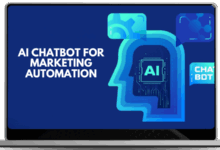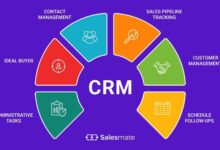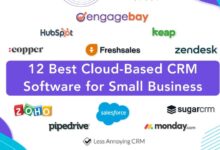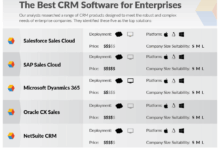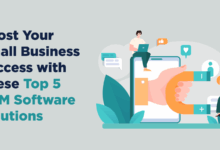AI-Powered CRM Software: A Comprehensive Guide
AI-Powered CRM Software revolutionizes customer relationship management, moving beyond traditional systems to leverage the power of artificial intelligence. This transformative technology offers businesses unprecedented opportunities to enhance sales efficiency, improve customer service, and gain valuable insights into customer behavior. We’ll explore the core functionalities, benefits, and future trends of this rapidly evolving field.
This guide delves into the key features of AI-powered CRM systems, including predictive analytics, lead scoring, and AI-driven chatbots. We’ll examine how machine learning algorithms power these features, improving data analysis and prediction accuracy. Furthermore, we’ll discuss the crucial aspects of integration, data security, and the ethical considerations involved in utilizing this powerful technology.
Defining AI-Powered CRM Software
AI-powered CRM software represents a significant evolution in customer relationship management, leveraging artificial intelligence to automate tasks, analyze data, and improve overall business efficiency. It goes beyond the capabilities of traditional CRM systems by providing intelligent insights and predictive capabilities that drive better decision-making and enhanced customer experiences.
AI-powered CRM software integrates various AI functionalities to optimize various aspects of customer interactions and business operations. These functionalities work together to streamline workflows, personalize communications, and improve sales and marketing outcomes. This ultimately leads to increased revenue and stronger customer relationships.
Core Functionalities of AI-Powered CRM Software
AI-powered CRM systems offer a range of core functionalities designed to improve efficiency and effectiveness. These functionalities are built upon the foundation of traditional CRM features but enhanced with the power of AI. Key features include intelligent data entry, automated workflows, predictive analytics, and personalized customer interactions. For example, AI can automatically populate customer data from various sources, reducing manual input and improving data accuracy. It can also trigger automated email sequences based on customer behavior or lifecycle stage, ensuring timely and relevant communication.
Key Differences Between Traditional CRM and AI-Powered CRM
Traditional CRM systems primarily focus on organizing and managing customer data. While valuable, they lack the predictive and analytical capabilities offered by AI-powered systems. AI-powered CRM goes beyond simple data management; it analyzes that data to identify patterns, predict future behavior, and offer insights that drive strategic decision-making. Traditional CRM requires manual data entry and analysis, often leading to inconsistencies and delays. AI-powered CRM automates many of these tasks, freeing up human resources for more strategic activities. The key differentiator is the ability of AI-powered CRM to proactively anticipate customer needs and personalize interactions at scale, a feat impossible with traditional methods.
Examples of AI Features Integrated into CRM Systems
Several AI features significantly enhance the capabilities of CRM systems. Predictive analytics, for instance, uses historical data and machine learning algorithms to forecast future trends, such as customer churn or sales opportunities. Lead scoring automatically ranks leads based on their likelihood of conversion, allowing sales teams to prioritize their efforts on the most promising prospects. Chatbots provide instant customer support, answering common questions and resolving issues efficiently, improving customer satisfaction and freeing up human agents to handle more complex queries. These are just a few examples; AI’s applications in CRM are constantly expanding.
Comparison of Leading AI-Powered CRM Platforms
The following table compares three leading AI-powered CRM platforms, highlighting their strengths and weaknesses. It is important to note that the best platform for a specific business will depend on its individual needs and priorities.
| Platform | Strengths | Weaknesses | Pricing Model |
|---|---|---|---|
| Salesforce Einstein | Robust AI features, extensive integrations, large user base, strong support | Can be expensive, complex to implement, requires significant technical expertise | Subscription-based, tiered pricing |
| Microsoft Dynamics 365 AI | Seamless integration with Microsoft ecosystem, user-friendly interface, cost-effective options | AI features may be less advanced than Salesforce Einstein, limited customization options | Subscription-based, tiered pricing |
| HubSpot CRM | Free plan available, intuitive interface, strong marketing automation features | AI features are less sophisticated compared to Salesforce or Dynamics 365, limited scalability | Freemium model, tiered pricing |
Benefits of Implementing AI-Powered CRM Software
Implementing AI-powered CRM software offers significant advantages across various business functions, leading to increased efficiency, improved customer relationships, and ultimately, enhanced profitability. The intelligent automation and predictive capabilities of AI transform how businesses interact with their data and customers, creating a more streamlined and effective operation.
AI’s Impact on Sales Efficiency
AI significantly boosts sales efficiency by automating repetitive tasks, providing sales teams with valuable insights, and optimizing sales processes. This allows sales representatives to focus on higher-value activities like building relationships and closing deals. For example, AI-powered lead scoring prioritizes leads based on their likelihood of conversion, ensuring sales teams concentrate their efforts on the most promising prospects. Predictive analytics can also forecast future sales trends, enabling proactive adjustments to sales strategies and resource allocation. Automated email campaigns and personalized recommendations further enhance engagement and conversion rates.
AI’s Enhancement of Customer Service and Satisfaction
AI transforms customer service by providing instant support, personalized interactions, and proactive problem-solving. AI-powered chatbots handle routine inquiries, freeing up human agents to focus on complex issues requiring empathy and nuanced understanding. Sentiment analysis tools identify customer emotions within feedback, allowing businesses to quickly address negative experiences and improve overall satisfaction. AI can also personalize customer interactions by recommending relevant products or services based on past behavior and preferences, enhancing the customer journey.
Examples of Successful AI-Powered CRM Implementations
Several businesses have successfully leveraged AI-powered CRM systems to achieve remarkable results. For instance, a large e-commerce company reported a 25% increase in sales conversion rates after implementing an AI-powered CRM that personalized product recommendations and automated email marketing. A financial institution saw a 15% reduction in customer service call handling time by using AI-powered chatbots to address common inquiries. These examples highlight the tangible benefits of integrating AI into CRM strategies.
Challenges Associated with AI-Powered CRM Adoption
While the benefits are significant, adopting AI-powered CRM also presents certain challenges. The initial investment in software and integration can be substantial. Furthermore, businesses need to ensure data quality and security to avoid inaccuracies and potential breaches. Training employees on how to effectively use the new system is crucial to maximizing its potential. Finally, integrating AI with existing systems may require significant technical expertise and careful planning to ensure a smooth transition.
Key Features of AI-Powered CRM Software
AI-powered CRM systems go beyond the capabilities of traditional CRM software by leveraging artificial intelligence to automate tasks, analyze data, and provide actionable insights. This results in significant improvements in sales efficiency, customer service, and overall business performance. These advanced features transform how businesses interact with their data and customers, leading to more strategic decision-making and enhanced customer relationships.
Predictive Lead Scoring in Sales Optimization
Predictive lead scoring utilizes AI algorithms to analyze various data points associated with leads, such as website activity, email engagement, and demographics, to assign a numerical score indicating the likelihood of conversion. Higher scores represent leads with a greater probability of becoming paying customers. This allows sales teams to prioritize their efforts on the most promising leads, maximizing efficiency and improving conversion rates. For example, a company selling enterprise software might use predictive lead scoring to identify leads who have downloaded white papers, attended webinars, and visited pricing pages – indicating a higher level of engagement and purchase intent. This allows sales representatives to focus on these high-potential leads, rather than spending time on less promising prospects.
AI-Powered Chatbots Enhancing Customer Interactions
AI-powered chatbots provide instant, 24/7 customer support, answering frequently asked questions, resolving simple issues, and guiding customers through the sales process. These chatbots learn from past interactions, improving their responses over time and providing increasingly personalized customer experiences. For instance, a chatbot on an e-commerce website can help customers find products, track orders, and handle returns, freeing up human agents to focus on more complex issues. This immediate responsiveness significantly enhances customer satisfaction and reduces wait times.
AI-Driven Sales Forecasting and Reporting
AI-driven sales forecasting and reporting tools analyze historical sales data, market trends, and other relevant factors to predict future sales performance. This allows businesses to make data-driven decisions regarding inventory management, resource allocation, and sales target setting. For example, by analyzing past sales data and current market conditions, an AI-powered system could predict a potential dip in sales during a specific quarter, allowing the company to proactively adjust its marketing strategy or develop contingency plans. These insights enable more accurate forecasting and improved business planning.
Distinguishing Features of AI-Powered CRM vs. Standard CRM
The following features clearly differentiate AI-powered CRM systems from their standard counterparts:
- Predictive Analytics: AI-powered CRMs utilize machine learning to predict future outcomes, such as customer churn or sales performance.
- Automated Lead Qualification: AI algorithms automatically qualify leads based on pre-defined criteria, saving sales teams valuable time.
- Personalized Customer Experiences: AI enables the delivery of personalized content, offers, and support based on individual customer preferences and behavior.
- Intelligent Sales Routing: AI directs leads to the most appropriate sales representative based on expertise and availability.
- Advanced Reporting and Dashboards: AI-powered CRMs offer sophisticated reporting and visualization tools that provide deeper insights into business performance.
- Improved Customer Service: AI-powered chatbots and virtual assistants provide instant and personalized customer support.
AI Algorithms and Machine Learning in CRM
AI-powered CRM systems leverage various machine learning algorithms to analyze vast amounts of customer data, predict future behavior, and automate tasks, ultimately improving efficiency and customer relationships. These algorithms learn from patterns and trends within the data, becoming more accurate and insightful over time. This leads to more effective marketing campaigns, improved sales strategies, and enhanced customer service.
Machine learning algorithms significantly enhance data analysis and prediction accuracy within CRM systems by identifying subtle relationships and patterns that would be impossible for humans to detect manually. This enables more targeted marketing, personalized customer experiences, and proactive issue resolution. The algorithms’ ability to continuously learn and adapt ensures that the CRM system remains relevant and effective even as customer behavior changes.
Types of Machine Learning Algorithms in AI-Powered CRM
Several machine learning algorithms contribute to the power of AI-driven CRMs. These algorithms fall into various categories, each suited for specific tasks. For example, supervised learning algorithms, such as linear regression and support vector machines (SVMs), are used for predictive modeling, forecasting future customer behavior based on historical data. Unsupervised learning algorithms, like clustering and association rule mining, help identify customer segments and uncover hidden relationships in the data. Reinforcement learning, a more advanced technique, enables the system to learn optimal strategies through trial and error, improving its performance over time. Deep learning algorithms, utilizing neural networks, are increasingly used for complex tasks such as natural language processing (NLP) for sentiment analysis in customer reviews or image recognition for visual data analysis.
Improved Sales Conversion Rates through AI Algorithms
Imagine a scenario where an AI-powered CRM analyzes past sales data, identifying key factors influencing conversion rates. The system discovers that customers who engage with specific types of email content are significantly more likely to make a purchase. Using this insight, the CRM automatically segments customers based on their engagement patterns and personalizes email marketing campaigns accordingly. This targeted approach leads to a 15% increase in sales conversion rates compared to a generic marketing campaign, demonstrating the direct impact of AI-driven insights on business outcomes. For example, a company selling high-end kitchen appliances might find that customers who viewed videos demonstrating product features had a much higher conversion rate. The AI could then prioritize sending video-focused marketing materials to similar prospects.
AI Adaptation to Changing Customer Behavior
AI algorithms continuously learn and adapt to evolving customer behavior. For instance, if customer preferences shift towards a particular product category, the AI will detect this change by analyzing purchase history, website browsing patterns, and social media engagement. The system will then adjust its recommendations, marketing campaigns, and sales strategies accordingly, ensuring the CRM remains aligned with the dynamic needs of the customer base. A clothing retailer, for example, might see a sudden increase in demand for sustainable and ethically sourced clothing. The AI would automatically adapt its product recommendations and marketing messaging to reflect this shift in consumer preferences, optimizing sales opportunities within this emerging trend.
Integration and Data Security
Seamless integration with existing systems and robust data security are paramount for the successful implementation of any AI-powered CRM. A poorly integrated or insecure system can lead to data silos, operational inefficiencies, and significant legal and reputational risks. This section details the critical aspects of integration and the security measures necessary to protect sensitive customer data.
Successful implementation hinges on the ability to seamlessly integrate the AI-powered CRM with existing business systems, such as marketing automation platforms, ERP systems, and e-commerce platforms. This integration ensures data consistency, reduces manual data entry, and streamlines workflows, leading to improved efficiency and better decision-making. Without proper integration, the value of the AI-powered CRM is significantly diminished.
Seamless Integration with Existing Business Systems
Effective integration requires careful planning and consideration of various factors, including data formats, APIs, and security protocols. A well-integrated system allows for the bi-directional flow of data, enabling real-time updates and consistent information across all platforms. For example, integrating with a marketing automation platform allows for automated campaign triggering based on CRM data, such as customer behavior or purchase history. Similarly, integration with an ERP system enables accurate tracking of sales and inventory, providing a holistic view of the business. A robust API strategy is essential to facilitate these integrations.
Data Security Measures to Protect Sensitive Customer Information
Protecting sensitive customer data is crucial. AI-powered CRMs should employ multiple layers of security to safeguard this information, including encryption both in transit and at rest, access control measures based on roles and permissions, regular security audits, and compliance with relevant data privacy regulations such as GDPR and CCPA. Multi-factor authentication should be mandatory for all users, and intrusion detection systems should be in place to monitor for suspicious activity. Data loss prevention (DLP) measures are also critical to prevent accidental or malicious data breaches. Consider implementing a zero-trust security model, where access is granted based on continuous verification, rather than relying on implicit trust.
Data Migration to an AI-Powered CRM System
Migrating data to a new AI-powered CRM system requires a well-defined plan and execution. This process typically involves data extraction, transformation, and loading (ETL). Data cleansing is a critical step to ensure data accuracy and consistency. The migration process should be carefully tested and validated to minimize disruption to business operations. Consider a phased approach, migrating data in stages to minimize risk and allow for iterative adjustments. For instance, you might start by migrating only a subset of your customer data to test the system and processes before migrating the entire dataset.
Best Practices for Ensuring Data Privacy and Compliance
To ensure data privacy and compliance, organizations should adhere to the following best practices:
- Implement a comprehensive data privacy policy and regularly train employees on data security best practices.
- Conduct regular data security assessments and penetration testing to identify vulnerabilities.
- Maintain detailed audit trails of all data access and modifications.
- Establish clear data retention policies and procedures.
- Implement data anonymization or pseudonymization techniques where appropriate.
- Engage in regular data privacy impact assessments to identify and mitigate potential risks.
Compliance with relevant regulations is not merely a legal requirement; it’s a demonstration of commitment to customer trust and responsible data handling.
Future Trends in AI-Powered CRM
The landscape of AI-powered CRM is constantly evolving, driven by rapid advancements in technology and the increasing demand for more intelligent and efficient customer relationship management. Emerging technologies are poised to significantly reshape the capabilities and applications of AI in CRM, leading to more personalized, predictive, and proactive customer interactions. This section explores these key trends and their potential impact.
The Impact of Emerging Technologies on AI-Powered CRM
Blockchain technology, with its inherent security and transparency, offers the potential to enhance data integrity and trust within CRM systems. Imagine a scenario where customer data is immutably recorded on a blockchain, ensuring its accuracy and preventing unauthorized modifications. This could be particularly valuable in industries with stringent data privacy regulations. Similarly, the Internet of Things (IoT) generates vast amounts of real-time data from connected devices, providing valuable insights into customer behavior and preferences. Integrating IoT data with AI-powered CRM can enable businesses to offer highly personalized and proactive services, such as predictive maintenance or customized product recommendations based on usage patterns. For example, a smart refrigerator could automatically reorder groceries based on consumption data, seamlessly integrated with the CRM system to track customer preferences and purchasing habits.
Future Features and Functionalities of AI-Powered CRM Systems
Future AI-powered CRM systems are expected to exhibit significantly enhanced capabilities. Predictive analytics will become even more sophisticated, enabling businesses to anticipate customer needs and proactively address potential issues. Hyper-personalization will reach new levels, with CRM systems tailoring interactions to individual customer preferences and behavior in real-time. Furthermore, AI-powered chatbots and virtual assistants will become more sophisticated, capable of handling complex customer inquiries and resolving issues autonomously. Imagine a system that anticipates a customer’s need for support before they even contact the company, based on their usage patterns and past interactions. This proactive approach will significantly improve customer satisfaction and loyalty.
Challenges and Opportunities Presented by the Increasing Use of AI in CRM
The increasing use of AI in CRM presents both challenges and opportunities. One key challenge is ensuring data privacy and security, particularly as more sensitive customer data is collected and analyzed. Robust data governance frameworks and compliance with relevant regulations will be crucial. Another challenge lies in managing the ethical implications of AI-driven decision-making, ensuring fairness and avoiding bias in algorithms. Opportunities abound, however, in terms of improved customer experience, increased operational efficiency, and enhanced business insights. By leveraging AI effectively, businesses can gain a competitive advantage by better understanding their customers and delivering superior service.
An Ideal AI-Powered CRM System in the Next Five Years
In the next five years, an ideal AI-powered CRM system will be a seamless, intuitive platform that proactively anticipates and fulfills customer needs. It will integrate seamlessly with other business systems, providing a holistic view of the customer journey. The system will leverage advanced predictive analytics to anticipate customer churn, personalize marketing campaigns, and optimize sales processes. It will incorporate advanced natural language processing (NLP) capabilities for effortless communication and seamless interaction with customers across multiple channels. Moreover, it will be built with robust security measures to protect sensitive customer data and ensure compliance with relevant regulations. This system would represent a significant leap forward in CRM technology, empowering businesses to build stronger, more profitable customer relationships.
Final Summary
AI-powered CRM software represents a significant advancement in customer relationship management, offering businesses a powerful toolkit to optimize sales, enhance customer satisfaction, and gain a competitive edge. By understanding the capabilities, limitations, and future trends of this technology, businesses can effectively leverage AI to achieve their strategic goals and navigate the ever-changing landscape of customer interactions. The careful consideration of data security and ethical implications is paramount for successful and responsible implementation.
